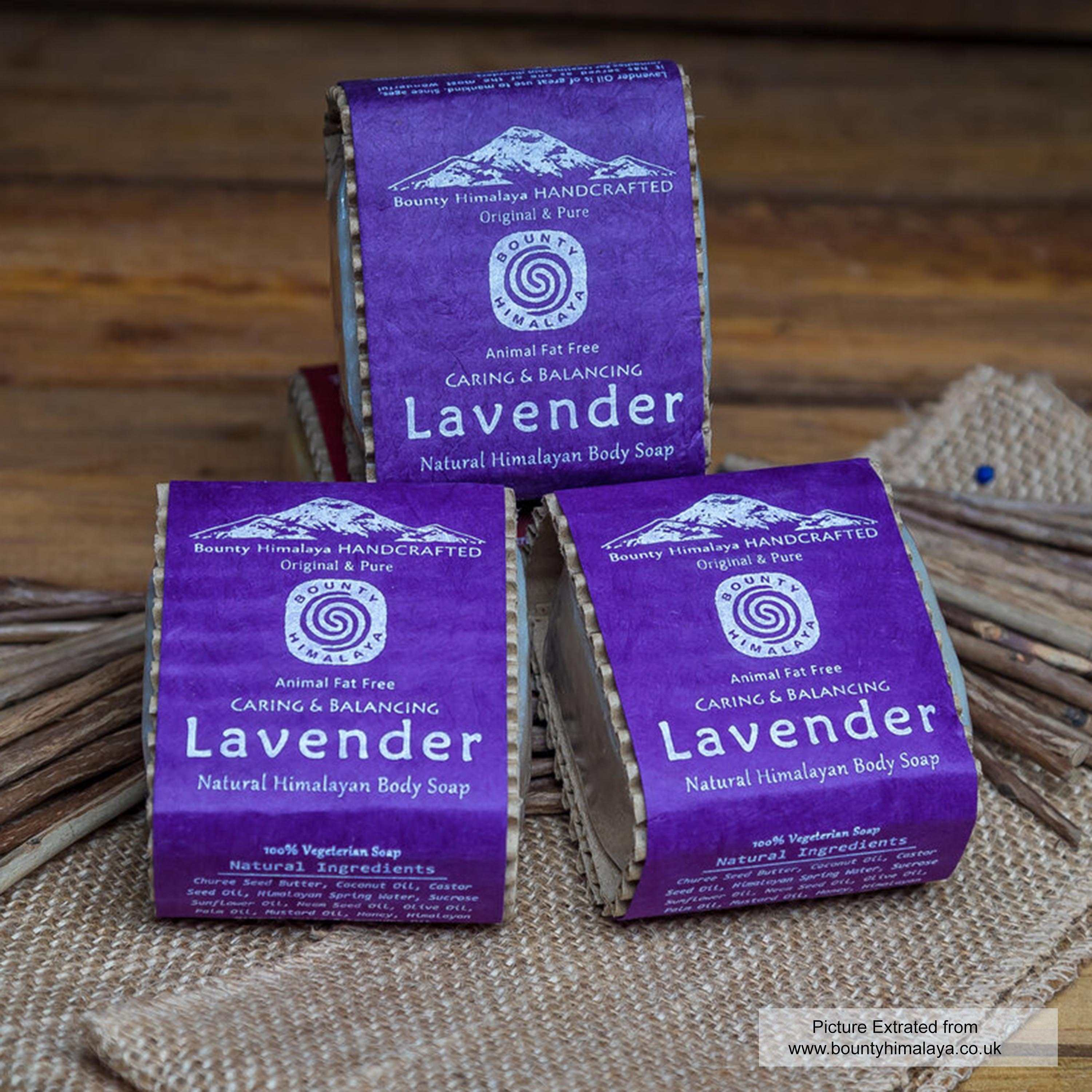100g Of Caring, Balancing And Stimulating Natural Body Soap.
Not Tested On Animals, Contains No Animal Fat And Is Chemical Free And Therefore, Completely Biodegradable.
SUITABLE For VEGETARIANS And VEGANS As This Product Contains No Animal Products - Yeah.
Ingredients
COCONUT Oil, CASTOR Oil, PHULWARA Butter, SESAME Oil, SUNFLOWER Oil, APRICOT Oil, NEEM Oil, GLYCERIN, MUSTARD Oil, AND LAVENDER Oil.
Herbal Soap
Most commercial soaps contain chemicals that can be harmful to the skin, and using natural herbal soap can be a good alternative. Herbal soaps are made using natural herbs and ingredients that are healthier and more beneficial to the skin and are less likely to cause any harmful effects. Some natural soap manufacturers also use aromatherapy and herbal treatments to offer the best skincare.
Crafted with rare herbs and 100% raw ingredients, herbal soaps have been proven to be particularly beneficial to the skin. The herbs infused in these soaps have therapeutic and healing characteristics that offer special benefits to the skin, such as nourishment, strength, healing, and moisturizing. These soaps also contain super fatty oils, vitamin E, aloe vera, and essential oils, all of which lead to goodness.
Herbal soaps are also useful in the treatment of numerous skin problems. These soaps also contain glycerin, which is not commonly found in industrial soaps. Glycerin helps to preserve moisture in the skin, making these soaps suitable for dry skin conditions.
Read More
Ingredients
Nice quality herbal soaps are made from raw extracts, edible oils, mineral oils, and other natural ingredients. Some common ingredients used to produce these soaps are certified organic olive, coconut, palm, soybean, castor, and almond oils, with the addition of cocoa butter, shea butter, aloe vera, vitamin e, and essential oils.
These soaps contain no additives, synthetics, fillers, petroleum distillates, liquids, dyes or metals.
Various types of herbs used to produce these soaps include burdock, comfrey, eucalyptus, hyssop, oat straw, plantain, red clover, rosemary, and witch hazel.
The various types of essential oils used to produce herbal soaps are
Olive Oil - Rich in Vitamin E and works as a humectant for skin. Produces silky bubbles
Coconut Oil - Rich in moisturizing properties and helps create a hard bar of soap with fluffy bubbles/lather
Palm Oil - Good for the conditioning of skin and helps make a hard bar
Soy Bean Oil - Rich in vitamins A, E & K. Provides good natural antioxidant and moisturizing properties
Cocoa Butter - Softens and protects the dry and chapped skin. It is a super-emollient produced during the manufacture of cocoa and chocolate
Buying tips
Check the ingredients carefully when choosing a herbal soap. Any producers of soaps may also say that they use additives, such as lavender, although they simply use lavender scented oil, which is not the same thing as essential oil and does not produce the same result. Scented oil is not the same thing as essential oils and does not produce the same result. Suitable herbal soaps can be chosen based on the quality and reaction of your skin. A moisturizing soap with natural and herbal ingredients may be picked to achieve the best results.
Soaps produced using conventional cod processing methods should be preferred as they preserve and maintain the nutritious value of the herbs used in the manufacture of soap.
If your skin is dry, you can use a natural soap made with oatmeal and/or avocado extracts. Herbal soaps made for dry skin usually contain lavender, peppermint, and spearmint oils, which tend to remove impurities in the skin. If you have oily skin, look for a natural soap with almond oil or one made with calendula oil. Tea oil-containing soaps are also considered to be effective in treating oily skin conditions.
Lavender : Brief Introduction
Lavender is a flowering plant in the mint family that’s easily identified by its sweet floral scent. It’s believed to be native to the Mediterranean, the Middle East, and India, with a history dating as far back as 2,500 years.
In ancient times, lavender was used as a holy herb. Additionally, it was often used to freshen up and give a light scent to a variety of personal items, such as clothes and hair.
What Are Possible Health Benefits of Lavender?
Today, lavender is more than just a fragrant plant. As it turns out, this herb is also commonly used for medicinal and therapeutic benefits. So if you’re dealing with a few medical issues of your own, and you don’t want to risk the unpleasant side effects that come with many over-the-counter and prescription medicines here’s a look at the potential health perks of using lavender.
May Help Improve Sleep
Insomnia is a nagging problem that keeps you tossing and turning throughout the night. Cutting out caffeine and getting more exercise might help induce sleep. But sometimes these efforts and others remedies don’t work. As a result, you end up in a groggy mess in the daytime.
If you’re willing to try anything for a restful night’s sleep, a study published in March 2017 in the British Association of Critical Nurses found lavender essential oil to be an effective remedy in improving the sleep quality of intensive care units (ICU) patients who had difficulty sleeping.
So if you’ve tried other sleep remedies to no avail, place a few drops of lavender essential oil on your pillow before going to sleep tonight. Just be sure not to ingest it, or any other essential oil, for that matter, as doing so may pose health harm.
Benefits of Lavender
May Help Improve Sleep
Could Help Treat Skin Blemishes
May Offer a Natural Remedy for Pain
Reduce Blood Pressure and Heart Rate
Could Relieve Asthma Symptoms
Lessens Menopausal Hot Flashes
Help Combat Fungus Growth
Potentially Promotes Hair Growth
Read More
